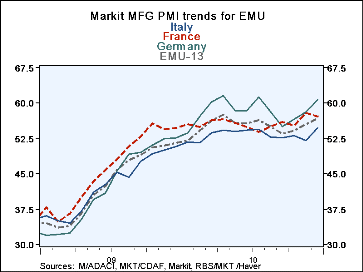 Global| Jan 03 2011
Global| Jan 03 2011EMU MFG PMIs Show Strength
Summary
EMU PMIs are in a clear revival despite concerns about austerity in 2011 and market-related financing concerns. This week the Zone's access to market credit is tested as several issuers hit the finical trough for sustenance. Against [...]
 EMU PMIs are in a clear revival despite concerns about austerity in 2011 and market-related financing concerns.
This week the Zone's access to market credit is tested as several issuers hit the finical trough for sustenance.
Against the back ground of this improved economic data access might be granted.
EMU PMIs are in a clear revival despite concerns about austerity in 2011 and market-related financing concerns.
This week the Zone's access to market credit is tested as several issuers hit the finical trough for sustenance.
Against the back ground of this improved economic data access might be granted.
The Zone's index for MFG advances to a strong 57.1 in December from 53.3 in November. It stands in the 97th percentile of its range just a tick stronger than Germany's standing in its own range (but at a higher level for Germany). This drives home the point that that it is the whole of the EMU that is doing well but just the contribution of a strong German reading to an otherwise weak region.
Among the eight reporters in the table only France and Greece took a step back in December. While there are concerns about a debt downgrade in France the MFG index despite this downtick has the send strongest standing in its range among all these reports. Greece stand alone at the very weak 28th percentile of its range, a very low and difficult standing. Greece is under a lot of pressure, a heavy debt burden and high tax rate amid severe austerity measures to cope with its economic difficulties.
Ireland whose problems are more recent continues to post a reading in the top 15% of its range. Spain's MFG reading is in the top 20% and Italy's index stands in the top 13%. The countries on people's lists of being possibly in trouble are still showing improvement and solid to strong manufacturing gains - for the most part.
It's a good start to the new year's data.
| Markit MFG Indices | |||||||
|---|---|---|---|---|---|---|---|
| Dec-10 | Nov-10 | Oct-10 | 3Mo | 6Mo | 12Mo | Percentile | |
| Euro-13 | 57.11 | 55.33 | 54.60 | 55.68 | 55.42 | 55.40 | 97.6% |
| Germany | 60.71 | 58.10 | 56.61 | 58.47 | 58.31 | 58.29 | 97.1% |
| France | 57.18 | 57.92 | 55.18 | 56.76 | 55.86 | 55.76 | 96.8% |
| Italy | 54.73 | 51.96 | 53.01 | 53.23 | 53.25 | 53.27 | 87.9% |
| Spain | 51.46 | 50.02 | 51.22 | 50.90 | 50.86 | 50.61 | 80.1% |
| Austria | 57.66 | 55.23 | 56.02 | 56.30 | 56.64 | 56.78 | 90.2% |
| Greece | 43.05 | 43.89 | 43.62 | 43.52 | 43.91 | 43.76 | 28.5% |
| Ireland | 52.24 | 51.17 | 50.89 | 51.43 | 50.88 | 51.19 | 85.9% |
| Netherlands | 57.49 | 56.54 | 55.41 | 56.48 | 55.39 | 55.78 | 90.2% |
| Percentile is over range since March 2000 | |||||||
Robert Brusca
AuthorMore in Author Profile »Robert A. Brusca is Chief Economist of Fact and Opinion Economics, a consulting firm he founded in Manhattan. He has been an economist on Wall Street for over 25 years. He has visited central banking and large institutional clients in over 30 countries in his career as an economist. Mr. Brusca was a Divisional Research Chief at the Federal Reserve Bank of NY (Chief of the International Financial markets Division), a Fed Watcher at Irving Trust and Chief Economist at Nikko Securities International. He is widely quoted and appears in various media. Mr. Brusca holds an MA and Ph.D. in economics from Michigan State University and a BA in Economics from the University of Michigan. His research pursues his strong interests in non aligned policy economics as well as international economics. FAO Economics’ research targets investors to assist them in making better investment decisions in stocks, bonds and in a variety of international assets. The company does not manage money and has no conflicts in giving economic advice.
More Economy in Brief
 Global| Feb 05 2026
Global| Feb 05 2026Charts of the Week: Balanced Policy, Resilient Data and AI Narratives
by:Andrew Cates






